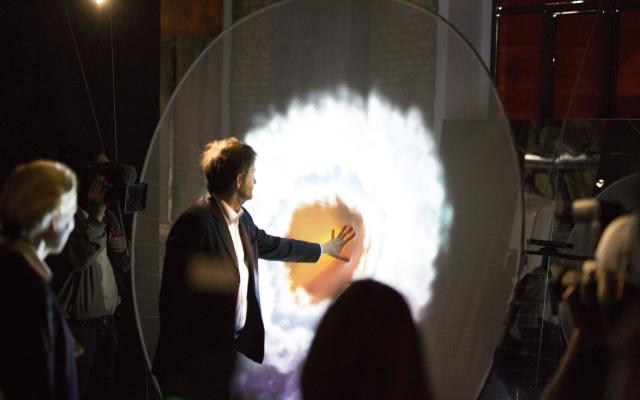The General Assembly on Birth Rates is underway in Rome
The General Assembly on Birth Rates (fifth edition) is underway in Rome, at the Auditorium della Conciliazione. We entrusted the report on the first day to Caterina Scotto Di Uccio, at her first public event as a member of the staff of the Fondazione Mondo Digitale. The organisation was involved in synergy with the Fondazione per la Natalità, Istat and the Società di ginecologia e ostetricia (Sigo), through the Voglia di futuro project, which accompanied students on a training course to design innovative campaigns.
‘The event touched on social, economic and cultural issues related to the phenomenon of declining birth rates, going beyond mere statistical analysis,’ says Caterina, who was very impressed by the opening speech by President Sergio Mattarella. ‘He emphasised that the demographic balance of a country reflects its life project and the image of its citizens' freedom to define its future.’
According to Gigi De Palo, president of the Birth Foundation, talking about birth rates is not an ideological issue, but a question of freedom, placing the human person, their potential and the future of the community at the centre. The aim is not to convince people to have children, but to ensure that those who want them have the opportunity to do so. Birth rates have been defined, in the words of Pope Francis, as the main indicator for measuring the hope of a people and their idea of the future.
The question that emerged during the speeches was: “change country or change the country?”. The answer, developed together with speakers and students, was that “in order not to change country, a little bit of the country must change”, and this requires cultivating hope in young people and making them feel listened to and supported by institutions.
The role of institutions and the difficulties faced by young people
Mattarella pointed out that birth rate issues are a clear expression of the duty of public institutions to enable citizens to express their vocation to parenthood in the interest of the common good. Demographic imbalances, which see society ageing and only partially regenerating itself, produce changes and crises in pre-existing structures, affecting the community's intangible assets such as the degree of civilisation and social cohesion. In particular, inland areas, especially in the south and on the islands, are most affected by the effects of demographic decline.
A crucial point highlighted is the condition of young people, who, in a society focused on speed, risk being constantly behind due to unfavourable conditions:
- delays in finding stable employment
- delays in becoming independent from their families of origin
- delays in accessing housing
- delays in starting a family and having children.
These difficulties include precariousness, low incomes and a lack of services that hinder the reconciliation of work and family life.
The President also referred to Article 31 of the Constitution, which states that the Republic shall facilitate the formation of families through economic measures and other provisions and protect motherhood, childhood and youth.
Data, testimonies and hope
- The voice of young people: Matteo Ferzioli, a clinical psychology student, testified that having a child is perceived as a risk to be calculated due to the lack of stable conditions. He stressed that having children should not be “a heroic choice or a luxury” and that society must invest in young people so that they are not forced to choose between private life and career. The declining birth rate is a collective problem that affects the sustainability of the system and confidence in the future.
- Istat data: Istat president Francesco Maria Chelli confirmed that Italy is experiencing a demographic winter. Between 2014 and 2024, 1.4 million people were lost, and net migration does not compensate for the declining birth rate. Despite this, 70% of young people want to have children and 50% would like to have more than two. It was also noted that the burden of domestic work is not shared equally.
- Inclusion and welfare: among the speakers, Nico Acampora (founder of PizzaAut) spoke about the inclusion of young people with disabilities, describing them as a social resource whose employment offsets social costs.
- Business focus: a panel of companies discussed solidarity, inclusion and internal welfare policies. Companies such as Fater and Enel highlighted the importance of a solid and stable welfare system to encourage people to stay and build their lives, with Enel actively supporting employees on their journey to parenthood.
- On fear: psychologist Daniela Lucangeli addressed the students' fear of the future, explaining that fear consumes learning energy; adults must encourage life in order to transform fear into a resource that indicates needs to be met.
In conclusion, Mattarella expressed a message of confidence: ‘We are not doomed to decline’. The future is the result of the choices we make today, and a society that welcomes life is a stronger society.
The debate therefore reiterated that generativity has human and social value, and it is the task of society as a whole to create an environment that ensures full freedom to have children. Demographic imbalances affect intergenerational cohesion; they are like a thermometer that measures social fever: it is not enough to treat the symptoms (the negative numbers), but we must act on the root causes (lack of conditions, precariousness and lack of hope) to restore a vital balance that allows the country to look to tomorrow.e cause profonde (mancanza di condizioni, precarietà e carenza di speranza) per ristabilire un equilibrio vitale che permetta al Paese di guardare al domani.



